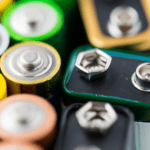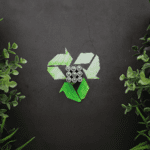
As the world embraces the digital age and relies more on portable electronic devices, the demand for batteries continues to rise. However, the improper disposal of batteries poses significant environmental risks due to the presence of toxic chemicals and heavy metals. British Columbia, known for its commitment to sustainability, has taken proactive measures to address this issue by implementing comprehensive battery recycling programs.
Improper disposal of batteries can have severe consequences for the environment. When batteries are discarded in regular waste streams and end up in landfills, they can release harmful chemicals such as lead, mercury, cadmium, and lithium into the soil and groundwater. These toxins can contaminate ecosystems, endanger wildlife, and pose a risk to human health. Recognizing the gravity of this issue, British Columbia has taken dynamic steps to implement a robust battery recycling framework including repurposing the batteries materials.
Batteries contain several materials that can be repurposed or recycled for various applications. The specific materials present in a battery depend on its type (e.g., alkaline, lithium-ion, nickel-metal hydride) and can include metals, plastics and chemicals. Besides being repurposed into new batteries here are some examples of how the materials can be reused:
- In Nickel based batteries, materials can be recycled into silverware, pots and pans or golf clubs.
- In Lithium-Ion batteries, materials can be recycled into steel and stainless steel products.
- Alkaline based batteries can be repurposed for steel products, sunscreen and concrete aggregate.
- Battery acid can be neutralized with chemicals to be turned into water that is cleaned and tested before being returned to the public water systems. Acid can also be reused in new batteries or converted to Sodium Sulfate.
Recently manufactured batteries can contain up to 80% recycled materials as all components of a battery can be recycled and repurposed into new batteries! Having such a high recycled material rate is an outcome of having dedicated battery recycling programs, especially in BC.
Canada’s Battery Recycling Programs & Stewardships:
- Call2Recycle: Call2Recycle is a nationally recognized battery recycling program that operates in British Columbia. It offers convenient drop-off locations across the province, including retail stores and municipal depots. The program accepts a wide range of batteries, including rechargeable batteries used in laptops, smartphones, power tools, and automotive applications. Call2Recycle ensures that collected batteries are properly recycled, minimizing the environmental impact.
- Encorp Pacific: Encorp Pacific is another organization dedicated to environmental stewardship in British Columbia. In addition to its beverage container recycling programs, Encorp Pacific offers battery recycling services. Through its Return-It™ program, Encorp Pacific establishes designated drop-off locations where consumers can safely dispose of used batteries. These batteries are then sent for recycling, with their components recovered and reused.
- Canadian Battery Association & Interstate Batteries
Battery recycling in British Columbia is not limited to the efforts of recycling organizations alone. The government, local communities, and businesses have joined hands to promote awareness and encourage active participation in recycling initiatives. Public education campaigns, community outreach programs, and workplace recycling initiatives have been launched to educate residents about the importance of battery recycling and provide them with the necessary resources to recycle their batteries responsibly.
As technology advances, new battery chemistries and designs emerge. To stay ahead of the curve, British Columbia continues to invest in research and innovation in the field of battery recycling. This includes exploring more efficient recycling processes, developing technologies for the recovery of valuable materials, and partnering with industry stakeholders to foster sustainable practices throughout the battery lifecycle. As British Columbia continues to prioritize environmental stewardship, it serves as a shining example for other regions to follow in building a more sustainable and circular economy.





